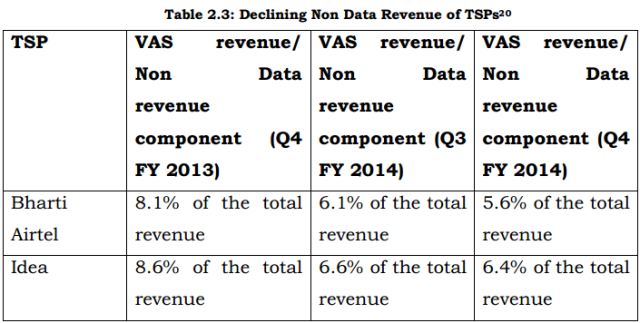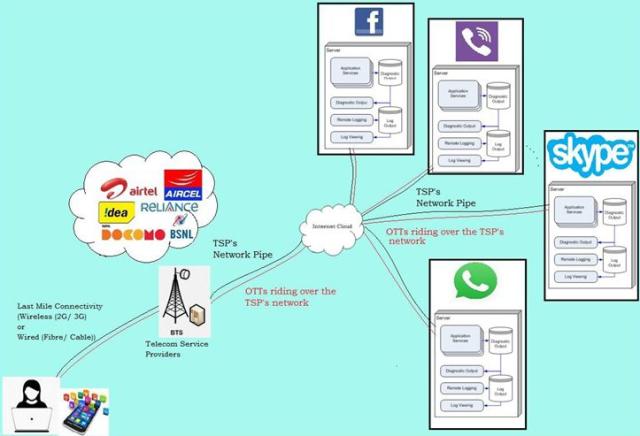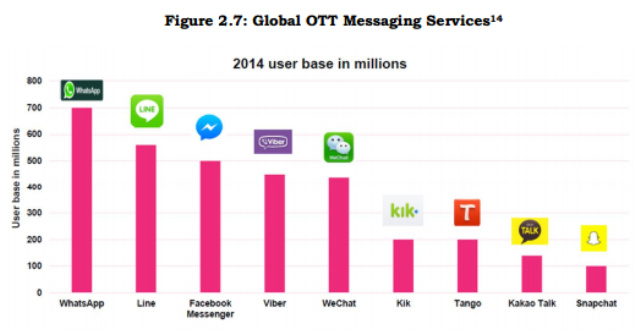The next level of face-off between Indian telecoms such as Bharti Airtel, Reliance Communications, etc. and OTT players like Skype, Viber, WhatsApp, Chat On, Snapchat, WeChat, Line, etc. will kick off soon with TRAI announcing its latest consultation paper.
Telecom Regulatory Authority of India (TRAI) in its latest consultation paper has listed benefits and key challenges to both telecom operators and OTT players.
Some of the following statistics – shared by the TRAI in its consultation paper – will be an eye opener for the telecom industry to review their business model.
For instance, the Microsoft-owned Skype in 2013 carried nearly 214 billion minutes of international on-net calls (from one Skype app to another). Skype’s traffic was almost 40 percent the size of the entire conventional international telecom market. In growth terms, it far outpaces the combined growth in the voice minutes of the global telecom industry.
TRAI points out that the impact on voice services is not considerable. First, India has one of the lowest voice calling rates. Indian mobile consumers pay around Rs 0.40 to 0.60. Second, the mobile internet penetration – mainly on 2G — is only around 20 percent. Third, the Quality of Service (QoS) of such OTT apps is not as good as traditional voice services offered by TSPs.
Incidentally, TRAI is not alone in the digital communication space to review activities of OTT giants. On March 12, 2015 Ofcom, telecom regulatory in Britain, launched a strategic review of the UK’s digital communications markets as it seeks to ensure that the industry continues to meet the needs of end users.
The last such review lasted almost two years, and ultimately led to the separation of BT’s access network. This time round the review is unlikely to focus on a further separation of the incumbent; instead it will ask where further deregulation can take place as a result of competition coming from so-called OTT players.
OTT messaging traffic explodes
In 2013, the worldwide annual SMS traffic was around 8.16 trillion messages against 18.3 trillion messages by OTT players. The OTT messaging traffic was expected to double in 2014.
In Spain in 2012, 63 percent of smartphone users used OTT apps for messaging primarily because the SMS was too highly priced. The OTT apps are popular due to the additional value they add to traditional messaging. The worldwide amount of messaging revenue loss to telecoms because of OTT apps will be around $50 billion in 2016.
Declining telecom messaging
The SMS traffic for the TSPs have shown declining trends in the recent past. The messaging traffic fell from 5346 million in June 2013 to 4367 million in June 2014, a decline of 18.3 percent. This decrease can be attributed almost entirely to an increase in traffic of OTT messaging apps. In the fourth quarter of 2014, Bharti Airtel and Idea Cellular, both Indian TSPs, have shown a significant drop in their messaging and Value Added Service (VAS) revenues as a percentage of total revenues.
OTT moves ahead
WhatsApp soft-launched its voice call functionality for Android devices in the version of the app released on 27 January 2015.
“WhatsApp’s expansion into voice calls is a significant event in the communications market. WhatsApp is probably the last major messaging platform to enable voice calls, but it is also the largest, with 700 million active users as of February 2015,” Stephen Sale, principal analyst and Aris Xylouris, research analyst at Analysys Mason.
Analysys Mason notes that services such as Skype have addressed limited use cases, such as video calling or cheap international calls, and have therefore typically functioned as a secondary voice service. However, WhatsApp’s high levels of service penetration in many countries (such as Germany and Spain) mean that the service will be viable as a primary voice service for many.
Growing WhatsApp
TRAI notes that WhatsApp’s subscriber base in India has increased to 70 million and it has a free subscription model (unlike in developed markets where the annual fee is $1). Similarly, the India-grown Hike messenger has a subscriber base of around 35 million as of August 2014 sending 0.5 billion messages per day. 83 percent of Indian internet users access the net through a mobile phone.
In January 2015, WhatsApp had 700 million monthly active users across the globe. WhatsApp is delivering on an average about 30 billion messages each day and this had grown to around 64 billion during April 2014.
In India, as on December 2014, WhatsApp topped the messaging application market with 52 percent of all the users using OTT messaging services, followed by Facebook Messenger with 42 percent, Skype with 37 percent and WeChat with 26 percent share. Viber stood at fifth spot with 18 percent share and Line stood at sixth position with 12 percent.
While Apple’s iMessage is integrated between approximately 800 million iOS devices, Apple claims that 40 billion iMessages were sent each day during January 2014.
“Because of low call tariffs, 80 percent of the customers prefer using the TSPs voice services. There is some amount of cannibalisation on international calling, where rates are substantially higher,” said TRAI.
TRAI said the revenue from international calls is less than 10 percent of an Indian operator’s total revenue.
Bharti Airtel has recorded 2.89 billion international outgoing minutes in the quarter ended June 2013, down from 3.79 billion minutes in the previous quarter while Idea’s outgoing minutes fell 7 percent sequentially in April-June 2013.
Reliance Communications’ international outgoing minutes also dropped nearly 10 percent in a quarter in the same period. The drop could be directly attributed to the growth of free calling services such as Skype or Viber.
OTT supports data growth
The TRAI note, quoting several analysts report, said the wholesale data usage also increased in recent times for the TSPs. In India, the mobile data revenues of Airtel rose from 6.5 percent of the mobile revenues in Q4 FY 2013 to 16.2 percent in Q3 FY 2015 with the mobile data revenue growing 74.3 percent in Q3 2015.
In India, data usage has increased from 49645 TB in Oct 2013 to 90267 TB in December 2014, showing a cumulative annual growth of 65.2 percent. The data revenue has nearly doubled, from Rs 3057.83 crore in June 2013 to Rs 5910.28 crore in September 2014. It is estimated that data revenue as a percentage of overall mobile revenue will reach 32 percent by 2015 against 14 percent in 2010.
Facebook recently used its F8 developer conference to announce two developments for Facebook Messenger: the introduction of the Messenger Platform and the preview of Businesses on Messenger.
“Facebook’s decision to open up its APIs to Facebook Messenger to third-party developers for the creation of content and apps is a vital step in the evolution of the messaging service which has, to date, lagged behind competitive offerings from the likes of Line, Kakao and Tencent (WeChat),” said Pamela Clark Dickson, principal analyst, Consumer Services at Ovum.
Will OTT challenge continue in India?
Analysys Mason said that operator service substitution is more extensive in the messaging market than in voice, and this is likely to continue in the short to medium term. However, the sheer size of WhatsApp’s network could disrupt the market and some operators are already adopting a defensive stance. For example, Etisalat has already banned the voice feature in the UAE. WhatsApp’s voice launch is yet another wake-up call for operators to improve their feature set in communication services.
TRAI must regulate OTT players if such initiatives bring additional revenue to India government. But such TRAI initiative should not penalize consumers of OTT services. If a carpenter in Kerala is sending an image of his work – through WhatsApp — in a rural place to get an order from Mumbai or Dubai, TRAI should encourage such technologies and services.
Baburajan K
[email protected]








